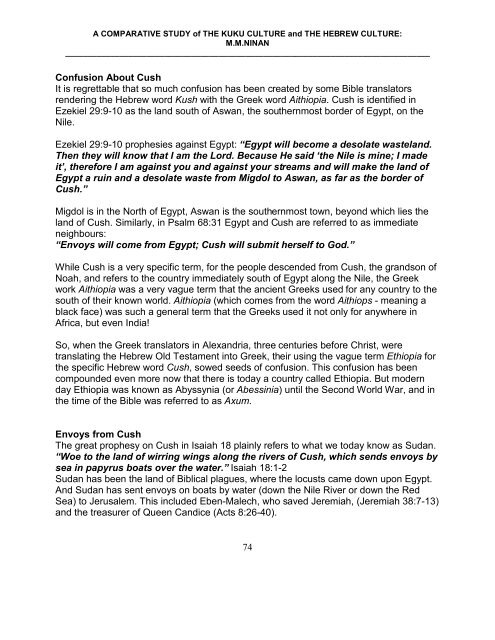kuku and Hebrew culture
Create successful ePaper yourself
Turn your PDF publications into a flip-book with our unique Google optimized e-Paper software.
A COMPARATIVE STUDY of THE KUKU CULTURE <strong>and</strong> THE HEBREW CULTURE:<br />
M.M.NINAN<br />
_________________________________________________________________________________<br />
Confusion About Cush<br />
It is regrettable that so much confusion has been created by some Bible translators<br />
rendering the <strong>Hebrew</strong> word Kush with the Greek word Aithiopia. Cush is identified in<br />
Ezekiel 29:9-10 as the l<strong>and</strong> south of Aswan, the southernmost border of Egypt, on the<br />
Nile.<br />
Ezekiel 29:9-10 prophesies against Egypt: “Egypt will become a desolate wastel<strong>and</strong>.<br />
Then they will know that I am the Lord. Because He said ‘the Nile is mine; I made<br />
it’, therefore I am against you <strong>and</strong> against your streams <strong>and</strong> will make the l<strong>and</strong> of<br />
Egypt a ruin <strong>and</strong> a desolate waste from Migdol to Aswan, as far as the border of<br />
Cush.”<br />
Migdol is in the North of Egypt, Aswan is the southernmost town, beyond which lies the<br />
l<strong>and</strong> of Cush. Similarly, in Psalm 68:31 Egypt <strong>and</strong> Cush are referred to as immediate<br />
neighbours:<br />
“Envoys will come from Egypt; Cush will submit herself to God.”<br />
While Cush is a very specific term, for the people descended from Cush, the gr<strong>and</strong>son of<br />
Noah, <strong>and</strong> refers to the country immediately south of Egypt along the Nile, the Greek<br />
work Aithiopia was a very vague term that the ancient Greeks used for any country to the<br />
south of their known world. Aithiopia (which comes from the word Aithiops - meaning a<br />
black face) was such a general term that the Greeks used it not only for anywhere in<br />
Africa, but even India!<br />
So, when the Greek translators in Alex<strong>and</strong>ria, three centuries before Christ, were<br />
translating the <strong>Hebrew</strong> Old Testament into Greek, their using the vague term Ethiopia for<br />
the specific <strong>Hebrew</strong> word Cush, sowed seeds of confusion. This confusion has been<br />
compounded even more now that there is today a country called Ethiopia. But modern<br />
day Ethiopia was known as Abyssynia (or Abessinia) until the Second World War, <strong>and</strong> in<br />
the time of the Bible was referred to as Axum.<br />
Envoys from Cush<br />
The great prophesy on Cush in Isaiah 18 plainly refers to what we today know as Sudan.<br />
“Woe to the l<strong>and</strong> of wirring wings along the rivers of Cush, which sends envoys by<br />
sea in papyrus boats over the water.” Isaiah 18:1-2<br />
Sudan has been the l<strong>and</strong> of Biblical plagues, where the locusts came down upon Egypt.<br />
And Sudan has sent envoys on boats by water (down the Nile River or down the Red<br />
Sea) to Jerusalem. This included Eben-Malech, who saved Jeremiah, (Jeremiah 38:7-13)<br />
<strong>and</strong> the treasurer of Queen C<strong>and</strong>ice (Acts 8:26-40).<br />
74


















